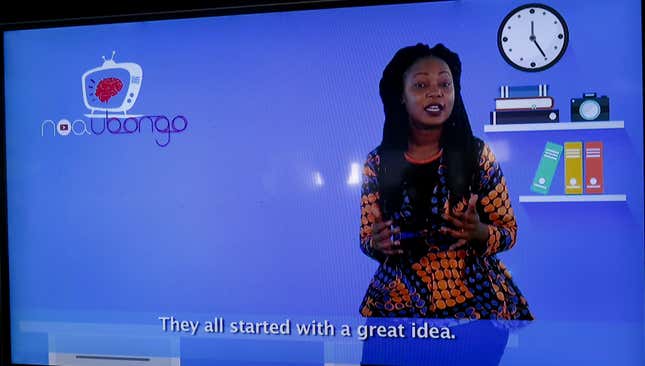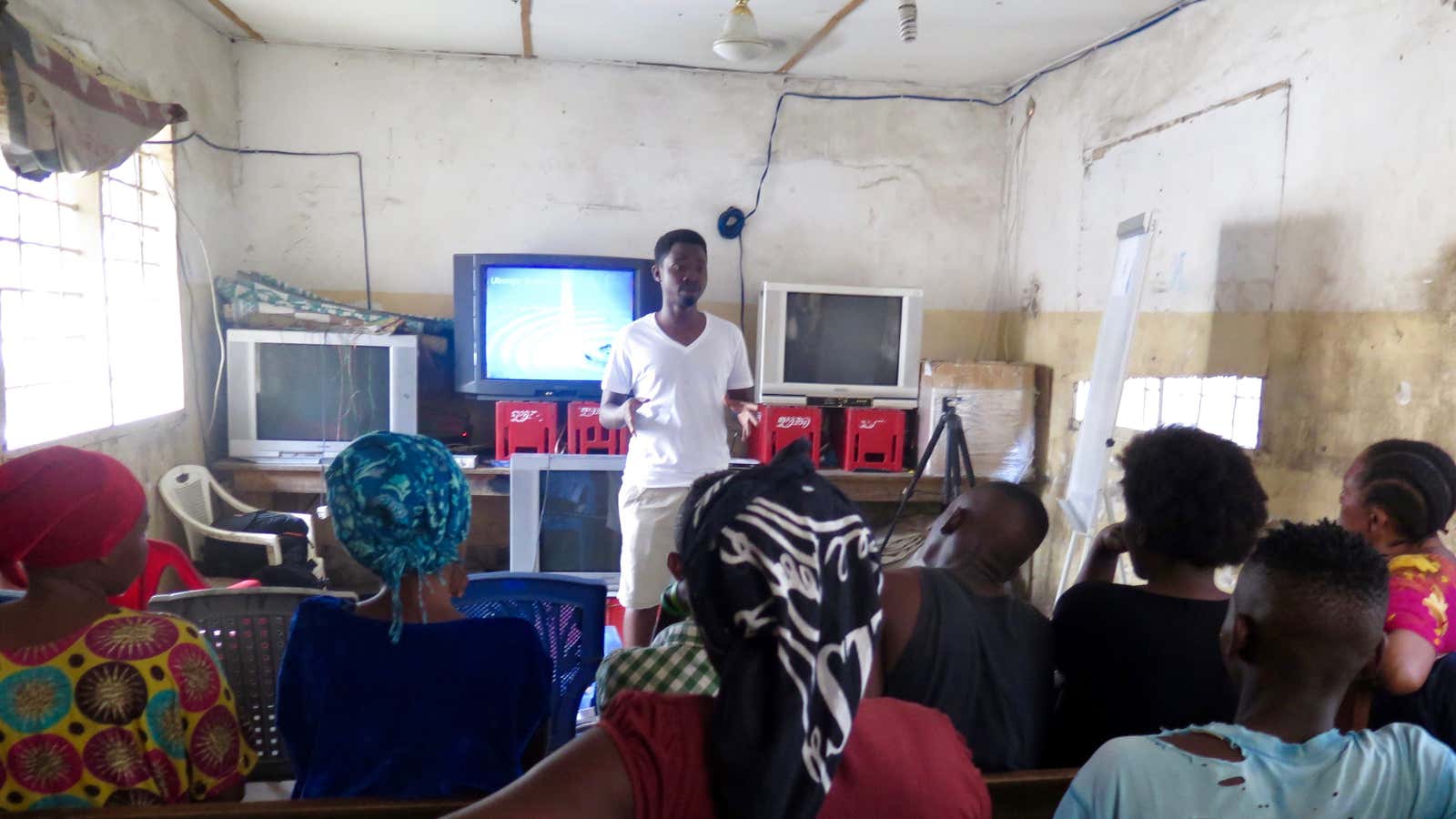Dar es Salaam
On weekends, Faraji Modibo usually enjoys watching football in a video “banda” or hall, a very simple room with televisions often perched on drink crates, popular with locals, especially those unemployed or not attending school, in Tanzania. Kung Fu movies and Nollywood films plus music clips are usually on offer for viewers, who sit on plastic chairs and wooden benches, for less than $1, about $3 cheaper than a film at a conventional cinema.
But on one Saturday in earlier this year, Modibo, 18, was surprised to see two short free videos with catchy graphics offering the 20 people gathered in the banda a “passport to a better life”. The 20-minute tutorials on how to write a CV and start a business are an initiative of “Noa Ubongo” (“Sharpen Your Brain”), a new free learning platform from a local advertising agency TBWAKhanga Rue Media.
Noa Ubongo, who launched in 2016 via Facebook but are now taking their innovation into the thousands of Tanzania’s video bandas, creating classrooms there, are one of many organizations helping fill the gap in the skills vacuum left by formal education in east Africa.
With employers and governments already aware of the shortage of well-trained workers and the high number of idle young people in many countries, there has been a shift in focus from simply creating and providing low-paying jobs that may not be sustainable, to also ensuring that youth have skills that will improve their employability and entrepreneurial ability.
“With this video, I learnt what to put and what not to put on my CV,” said Modibo, sitting in a video hall in Msasani suburb in Dar es Salaam.
“They didn’t teach us this in depth at school, just the basics,” added Modibo, who has one year of studies left before he hopes to find a bank job in the country’s largest city.

Youth unemployment in Tanzania is estimated anywhere between 10% to 15%. But at least one report believe the official statistics conceal a “larger problem of chronic underemployment”. Only 15% of youth had regular jobs, with most self-employed and earning very little, found the research, which highlighted the “critical dearth in the pool of skills demanded by employers”.
Dr Minou Fuglesang, the founder and executive director of Tanzanian non-profit Femina Hip, stressed the need for “employability skills”. “They’re the kind you can’t really teach through a curriculum, you have to teach them in context,” said Fuglesang, citing critical thinking and leadership as examples.
Femina Hip’s Ruka Juu TV series, of which the latest installment will air on free-to-air station East Africa Television (EATV) in August, follows six young entrepreneurs and the challenges and opportunities they face as they build a manufacturing business from start-up and incubation to full registration.
Before now, interventions to address youth unemployment have mainly involved government agencies, civil society organizations and international donors. But now others like private businesses and multinationals are getting onboard to help woefully unprepared young people get ready for the real world.
Through its Digital Skills program, Google is targeting youth plus small and medium-sized enterprises, offering 89 courses in subjects including social media, analytics, advertising and more, with 14 training partners covering 20 countries including Nigeria, Kenya, South Africa and Uganda, among others. In the latter, there has been a recent call by the education ministry to incorporate public speaking and decision making into secondary school lessons to better equip students.
To date Digital Skills, which also now offers offline training to people and businesses in remote areas who do not have internet access, in Swahili and other local languages, have reached one million Africans, and are targeting more.
“Whether it’s a dressmaker who plans on expanding worldwide through the tools technology provides them, or a content creator finding hundreds of thousands of viewers on YouTube, we hope this helps them grow,” said Google South Africa country director Luke Mckend.
Social business Well Told Story are targeting Tanzanians and Kenyans through their Emmy award-winning multimedia initiative Shujaaz (“Heroes”), which encompasses radio show broadcasts on local stations, comics, social media, online video and SMS using fictional characters offering youth tips on finding a job.
In Kenya there are just over two million young people who describe themselves as “hustlas” – those running small, entrepreneurial businesses -according to a 2016 report by Well Told Story.
“We are continuing to trial new ways to reach an ever-expanding audience of struggling youth entrepreneurs with accessible, youth-friendly media, ensuring they have the necessary information, skills and networks to succeed in life,” said programming director Bridget Deacon.
Noa Ubongo have already seen some success stories emerge. One man saved enough money for a plot of land and another landed a job after watching their video guides. They now plan to develop their website into an online learning platform, with integrated apps, quizzes, learning plans, mentor databases and develop podcasts linked to their tutorials[AF1] .
Creative director Pat Olvera said besides teaching skills, the platform was also “filling a psychological gap, encouraging and helping youth set small goals to and to look at the bigger picture”.
“They come away with something more important than knowledge, they come away with confidence,” he said.
